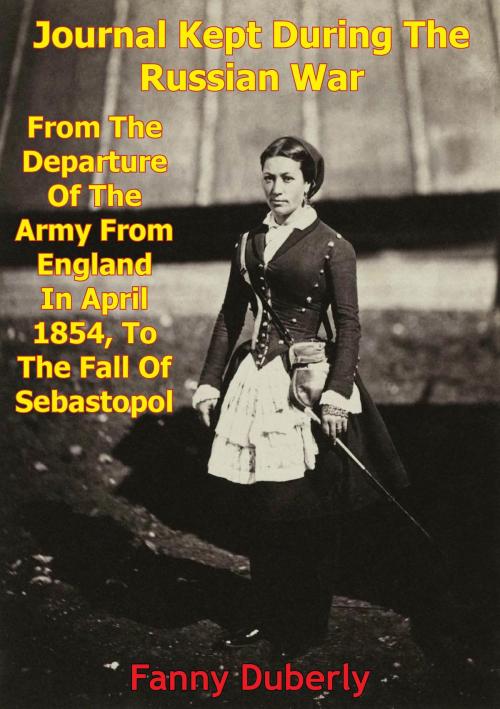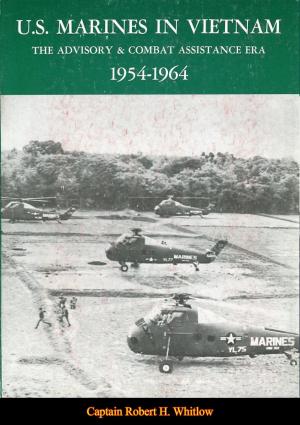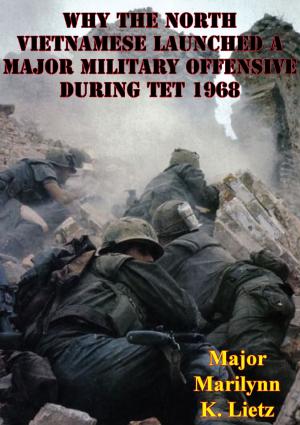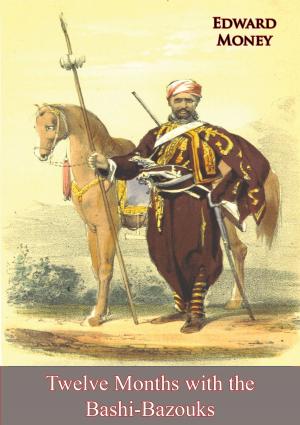Journal Kept During The Russian War: From The Departure Of The Army From England In April 1854 To The Fall Of Sebastopol
[Illustrated Edition]
Nonfiction, History, Military, Other, Asian, Russia, British| Author: | Frances Isabella ("Fanny") Duberly | ISBN: | 9781782895503 |
| Publisher: | Normanby Press | Publication: | August 15, 2014 |
| Imprint: | Normanby Press | Language: | English |
| Author: | Frances Isabella ("Fanny") Duberly |
| ISBN: | 9781782895503 |
| Publisher: | Normanby Press |
| Publication: | August 15, 2014 |
| Imprint: | Normanby Press |
| Language: | English |
[Illustrated with over two hundred and sixty maps, photos and portraits, of the battles, individuals and places involved in the Crimean War]
Frances Isabella ("Fanny") Duberly (27 September 1829 - January 1903) was the wife of Captain Henry Duberly, the 8th Royal Irish Hussars during the Crimean War, part of the British light cavalry that took part in the Charge of the Light Brigade. Duberley's journal of her time in the Crimea was published as Journal Kept During the Russian War. It not only includes eye-itness accounts, but is also a record of gossip and rumours circulating in the British Army.
Duberly travelled with her husband to the Crimea in 1854 and stayed with him throughout his time there, despite the protests of commanders such as Lord Lucan. As the only officer's wife at the front, she was a centre of attention. She was told of planned attacks ahead of time, giving her the opportunity to be in a good position to witness them. Such was the case at the Battle of Balaclava, where her journey from camp to meet up with Henry and watch the battle took her quite close to the enemy. Though her husband survived the day (being away on staff duties), many of her friends did not: "Even my closed eyelids were filled with the ruddy glare of blood." Being so close to the front line in one of the first "modern" wars, Mrs Duberly differed from many of her compatriots back home in comprehending the reality of war. When her husband asked if she wanted to view the aftermath of the Battle of Inkerman, she told him she could not as "the thought of it made me shutter [sic] and turn sick."
Duberly’s adventures did not always sit well with society. She was pointedly snubbed at the Royal review of her husband’s regiment after the war. The journal she published after the war had originally been intended to have a dedication to Queen Victoria, but this was refused. Nonetheless she was popular with the troops (who nicknamed her "Mrs. Jubilee") and many people in England.
[Illustrated with over two hundred and sixty maps, photos and portraits, of the battles, individuals and places involved in the Crimean War]
Frances Isabella ("Fanny") Duberly (27 September 1829 - January 1903) was the wife of Captain Henry Duberly, the 8th Royal Irish Hussars during the Crimean War, part of the British light cavalry that took part in the Charge of the Light Brigade. Duberley's journal of her time in the Crimea was published as Journal Kept During the Russian War. It not only includes eye-itness accounts, but is also a record of gossip and rumours circulating in the British Army.
Duberly travelled with her husband to the Crimea in 1854 and stayed with him throughout his time there, despite the protests of commanders such as Lord Lucan. As the only officer's wife at the front, she was a centre of attention. She was told of planned attacks ahead of time, giving her the opportunity to be in a good position to witness them. Such was the case at the Battle of Balaclava, where her journey from camp to meet up with Henry and watch the battle took her quite close to the enemy. Though her husband survived the day (being away on staff duties), many of her friends did not: "Even my closed eyelids were filled with the ruddy glare of blood." Being so close to the front line in one of the first "modern" wars, Mrs Duberly differed from many of her compatriots back home in comprehending the reality of war. When her husband asked if she wanted to view the aftermath of the Battle of Inkerman, she told him she could not as "the thought of it made me shutter [sic] and turn sick."
Duberly’s adventures did not always sit well with society. She was pointedly snubbed at the Royal review of her husband’s regiment after the war. The journal she published after the war had originally been intended to have a dedication to Queen Victoria, but this was refused. Nonetheless she was popular with the troops (who nicknamed her "Mrs. Jubilee") and many people in England.




![Cover of the book DRIVE NORTH - U.S. Marines At The Punchbowl [Illustrated Edition] by Frances Isabella (](https://www.kuoky.com/images/2015/november/300x300/9781786251503-gE5z_300x.jpg)

![Cover of the book The Battle For Khe Sanh [Illustrated Edition] by Frances Isabella (](https://www.kuoky.com/images/2014/august/300x300/9781782893561-wMLe_300x.jpg)
![Cover of the book How I Won My Victoria Cross [Illustrated Edition] by Frances Isabella (](https://www.kuoky.com/images/2014/august/300x300/9781782894797-YPts_300x.jpg)

![Cover of the book Old Memories (Of The Indian Mutiny 1857) [Illustrated Edition] by Frances Isabella (](https://www.kuoky.com/images/2014/august/300x300/9781782894896-UeCc_300x.jpg)

![Cover of the book Allied Marines In The Korean War: Train Wreckers And Ghost Killers [Illustrated Edition] by Frances Isabella (](https://www.kuoky.com/images/2014/august/300x300/9781782899259-kHMb_300x.jpg)


![Cover of the book The Yellow Star: The Moving Narrative Of A Boy Who Survived Auschwitz And Buchenwald [Illustrated Edition] by Frances Isabella (](https://www.kuoky.com/images/2015/november/300x300/9781786254313-QvQi_300x.jpg)
![Cover of the book The History of the French Revolution Vol II [Illustrated Edition] by Frances Isabella (](https://www.kuoky.com/images/2016/november/300x300/9781787202818-0Kkq_300x.jpg)